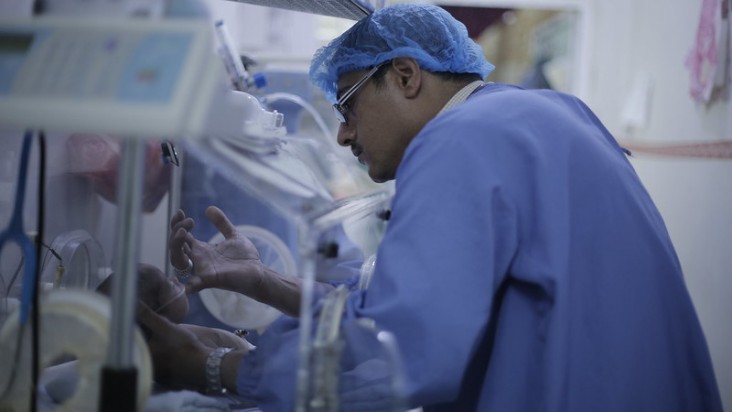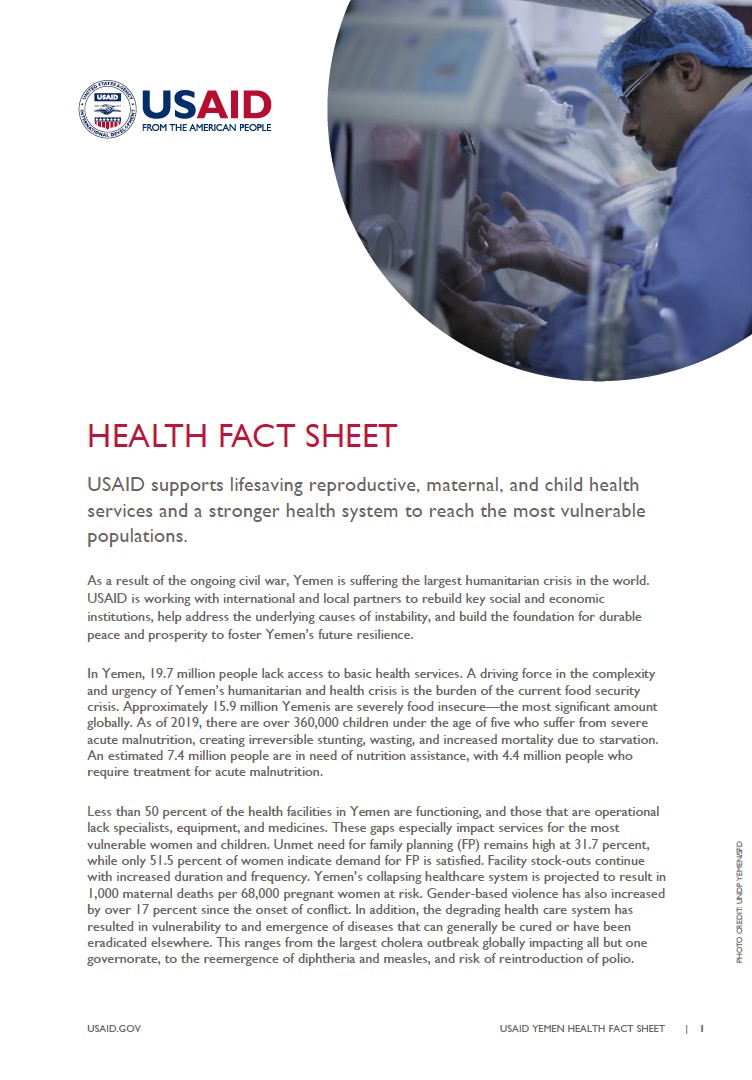Speeches Shim

USAID supports life-saving maternal, child health and family planning services, and a stronger health system that reaches the most vulnerable populations.
As a result of the ongoing civil war, Yemen is suffering the largest humanitarian crisis in the world. USAID is working with international and local partners to rebuild key social and economic institutions, help address the underlying causes of instability, and build the foundation for durable peace and prosperity to foster Yemen’s future resilience.
In Yemen, 19.7 million people lack access to basic health services. A driving force in the complexity and urgency of Yemen’s humanitarian and health crisis is the burden of the current food security crisis. Approximately 15.9 million Yemenis are severely food insecure—the most significant amount globally. As of 2019, there are over 360,000 children under the age of five who suffer from severe acute malnutrition, creating irreversible stunting, wasting, and increased mortality due to starvation. An estimated 7.4 million people are in need of nutrition assistance, with 4.4 million people who require treatment for acute malnutrition.
USAID Yemen Health Fact Sheet ![]() (pdf - 178k)
(pdf - 178k)
Less than 50 percent of the health facilities in Yemen are functioning, and those that are operational lack specialists, equipment, and medicines. These gaps especially impact services for the most vulnerable women and children. Unmet need for family planning (FP) remains high at 31.7 percent, while only 51.5 percent of women indicate demand for FP is satisfied. Facility stock-outs continue with increased duration and frequency. Yemen’s collapsing healthcare system is projected to result in 1,000 maternal deaths per 68,000 pregnant women at risk. Gender-based violence has also increased by over 17 percent since the onset of conflict. In addition, the degrading health care system has resulted in vulnerability to and emergence of diseases that can generally be cured or have been eradicated elsewhere. This ranges from the largest cholera outbreak globally impacting all but one governorate, to the reemergence of diphtheria and measles, and risk of reintroduction of polio.
USAID’S RESPONSE AND EXPECTED RESULTS
The USAID Yemen Systems, Health, and Resilience Project’s ultimate goal is to improve maternal and child health. The project takes a multipronged approach that includes: building the capacity of health facility staff and community midwives to deliver quality care; encouraging community engagement with the formal health system to build trust; improving management of district health authorities; exploring and piloting innovative financing mechanisms; and, strengthening Yemen’s health management information system to support effective health service management.
The USAID Strengthening Family Planning Services in Yemen project works to increase Yemenis’ access to reproductive health services. Specifically, the project improves the quality of reproductive health services and availability of family planning products, and supports the Ministry of Public Health and Population to improve the reproductive health policy environment. Health facility work aims to complement maternal and child health services already offered with the support of other actors, enabling a “one stop shop” for Yemenis to access a wider array of health services.
USAID also supports Yemen in preventing and combatting outbreaks of communicable diseases, including polio, a highly contagious disease of the nervous system that causes paralysis, and sometimes, death. Due to the ongoing conflict and subsequent displacement, many children are unable to receive the full course of polio vaccinations, which contain a weakened—but live—virus. Yemen is therefore at high risk for a vaccine-derived polio outbreak. USAID supports the World Health Organization to detect polio cases in real time in order to alert the international community to rapidly respond should an outbreak occur.


Comment
Make a general inquiry or suggest an improvement.